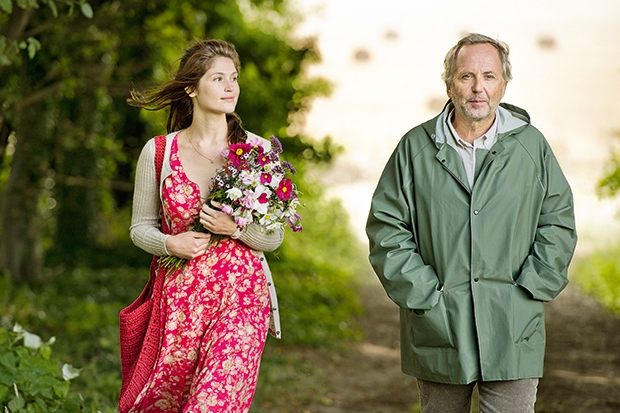Gemma Bovery is a modern-day refashioning of Gustave Flaubert’s literary masterpiece Madame Bovary, and while such refashionings can work well in some instances — Bridget Jones as Pride and Prejudice, for example, or West Side Story as Romeo and Juliet, if we want to go further back —this is not one of those instances. Instead, this is that other kind of instance; the one that desperately makes you wish they’d left well alone.
It’s based on the graphic novel by the writer-artist Posy Simmonds which, in turn, was based on her comic strip in the Guardian. It was the same with Tamara Drewe, Simmonds’s reworking of Thomas Hardy’s FarFrom the Madding Crowd, which was filmed in 2010, and also starred Gemma Arterton, and which was just as superficial and tiresome. (Advice for Ms Arterton: should someone come along with a project called, say, Hannah Karenina, just say ‘no’.) Here, Gemma plays Gemma, wife of Charles Bovery (Jason Flemying), a furniture restorer. They are English but, fed up of London, decide to relocate to a run-down cottage in the Normandy countryside. The story, such as it is, is told not through their eyes, but through those of a neighbour, Joubert (Fabrice Luchini), a doleful, middle-aged baker who loves classic literature and who becomes convinced that Gemma is tragically doomed; that Gemma’s story will duplicate the original Emma’s. He proceeds to watch her in a way that is meant to be amusingly harmless and fondly Maurice Chevalier-ish (but is, in fact, creepily stalkerish) while simultaneously developing the hots for her himself. Actually, scratch that. He doesn’t develop the hots for her. He is electrified from the off. And ogles from the off.
This is what I call ‘a Movie of the Panting Male Gaze’, which, considering it was written by a woman (Simmonds), and is directed by a woman (Anne Fontaine, Coco Before Chanel), is properly inexplicable, but there you are. Whenever Joubert and Gemma bump into each other, as they do often —you’d think no one else lived in this particular village — the camera lingers pantingly on her rack, and sometimes pantingly on her legs, and sometimes pantingly on her swishy hair, but mostly it’s her rack, although, fair play, rack, legs and swishy hair is all she is. There have been more substantial roles for women in Carry On films. Gemma is the male sexual fantasy made flesh and, as such, has been awarded no personality whatsoever, and no smarts whatsoever. Say your name was a near-homonym of that of one of the most famous characters in literature, ever, wouldn’t you be curious? Wouldn’t you wish to know something about that character and wouldn’t you be prompted to investigate, particularly as just about everybody is going to point it out? (Gemma Bovery? Seriously?) But this isn’t Gemma’s way. Indeed, it’s not just that she’s never read the novel (helpfully, though, Joubert does recite chunks of it as we go along); she doesn’t appear to have even cast her eye over the plot synopsis on Wikipedia. Nice rack, nice legs, nice hair, but if you’ve ever encountered a bigger idiot, I’d be most surprised.
The conceit — that Gemma’s life may emulate Emma’s — is what counts as plot, but it always feels like a conceit. There is no narrative drive. Is Gemma bored with provincial life? If so, we don’t see it, yet still she embarks on an affair with the local deathly dull aristo (Niels Schneider) while her ex-boyfriend (Mel Raido) also pops up, but who cares? They’re all as empty and vile as each other and there’s not a squeak of chemistry between any of them. The result is like watching dogs hump the furniture. It’s as scintillating as that. Plus, it does not evoke the novel in any way whatsoever, and I simply wished everyone had taken arsenic early on, so we could have all gone home. Like I said, the refashioning of classics can work well in some instances, but this instance is not one of those.






Comments